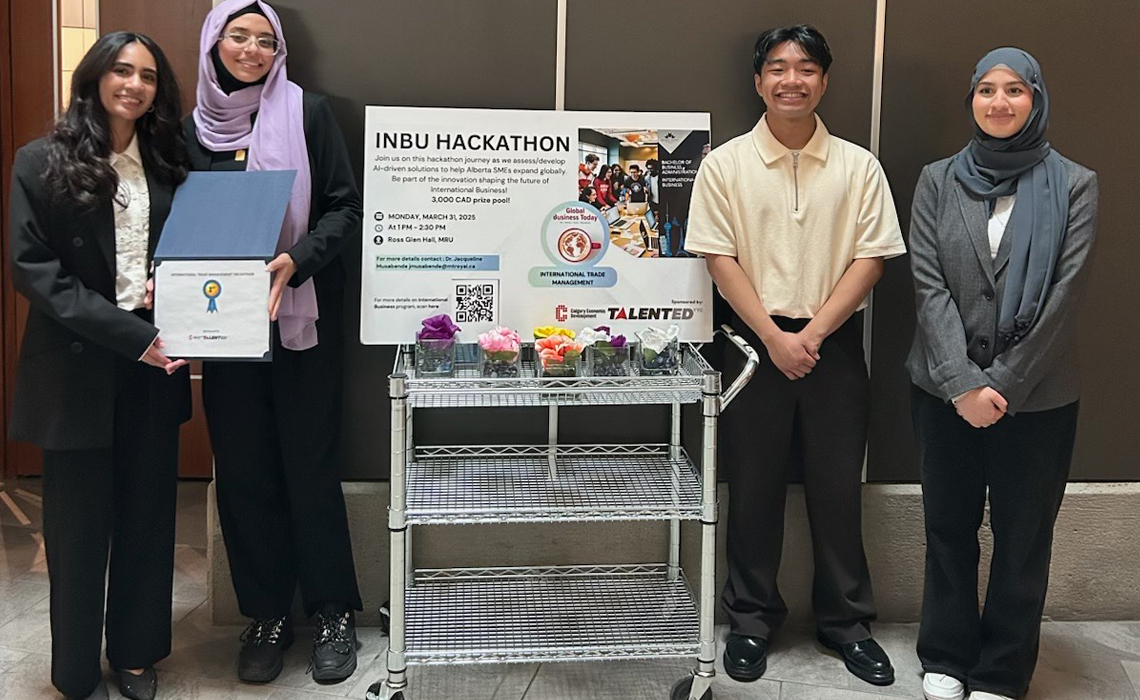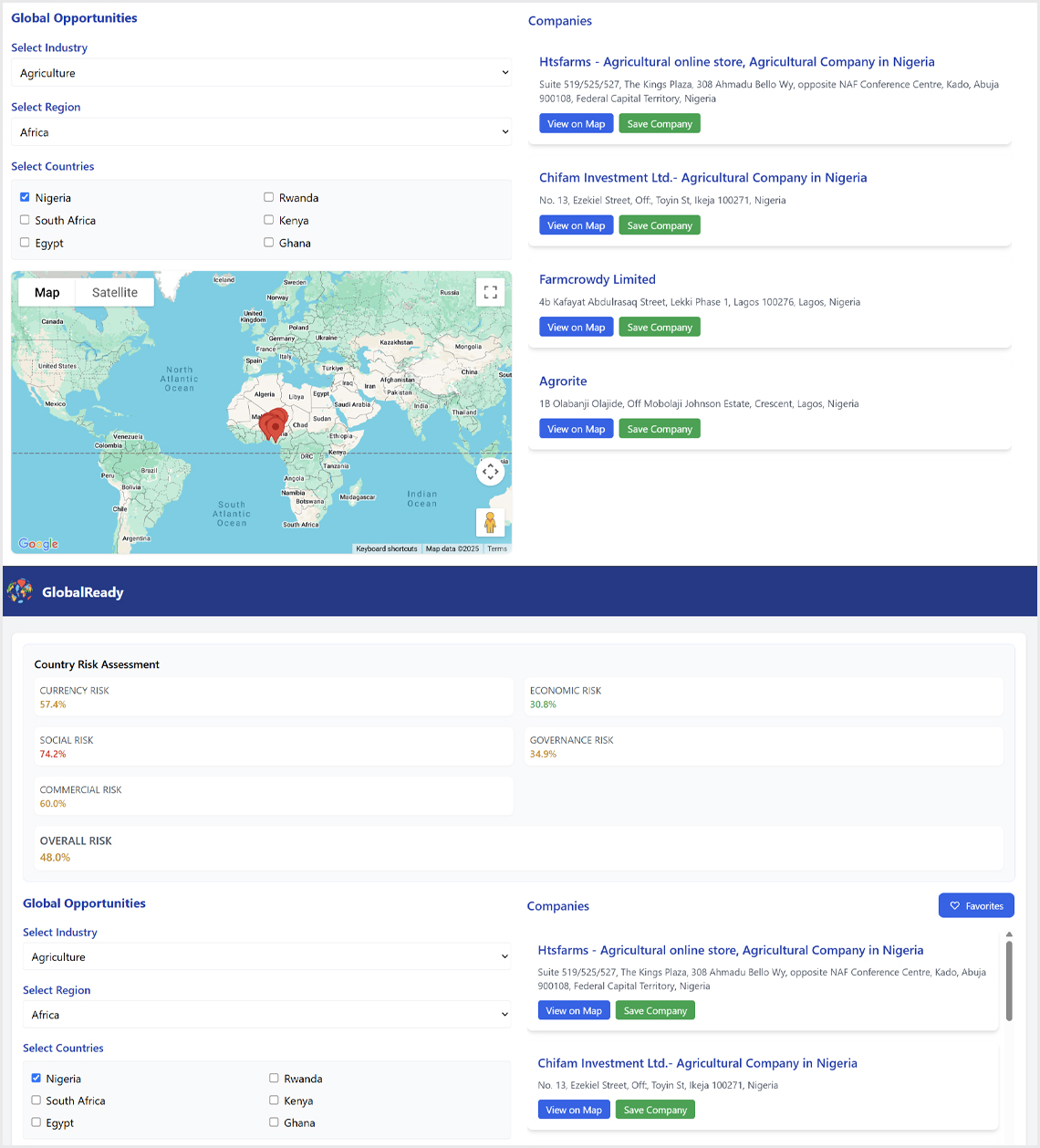AI could unlock global markets for SMEs

Students who took part in MRU’s INBU (International Business) Hackathon are tackling real-world problems from inside the classroom.
The event was put on by associate professor of international business, Dr. Jaqueline Musabende, PhD. Student groups had four weeks to develop and present an artificial intelligence (AI)-driven solution for Alberta’s small- and medium-sized enterprises (SMEs) that would help them expand globally and discover new opportunities. It all culminated in an event in Ross Glen Hall where each group shared their solutions with an audience, including a panel of judges who then awarded cash prizes. Sponsored by Calgary Economic Development through their TalentED program, there was a $3,000 prize pool up for grabs.
In attendance was Alberta’s Deputy Minister of Technology and Innovation Janak Alford. Many community members attended as well, with some serving as judges and sponsors, including Shane Jaffer from Invest Alberta, Dennis Agbegha, who acted as speaker, and Panayiotis Kantzilieris of BDC.
In total, four student groups took part from a variety of disciplines including international business, computer science and others.
It was a group of third-year Bachelor of Computer Information Systems students who took home the top prize of $1,500. Toka Hassan was one of four members and says currently most of Alberta’s SMEs work exclusively with counterparts in the U.S.
“With tariffs and trade barriers the goal was to help them explore global markets beyond the U.S. The challenge was to come up with an AI-driven solution that could assess a company's readiness to expand internationally and help them discover new opportunities.”
For their submission, Hassan along with her teammates, Prince Manzano, Maryam Abou El Nasr and Zeenat Iqbal, worked on a website that provided AI-powered recommendations to help businesses evaluate and improve their global readiness.
“The site had features such as a personalized assessment that would give feedback and recommendations to guide companies toward global growth,” Hassan explains. “It also provided international opportunities based on your selected industry and countries of interest.”
Each team member worked on a different part of the website. Manzano built the assessment scoring using real-time data from the World Bank. Taking statistics from various countries, he would then calculate the risks associated with doing business there looking at elements like social, economic and political factors.
Abou El Nasr handled the readiness scoring and AI implementation while Iqbal worked on the news portion, which took into account all of the news someone might want about a country before doing business there.

Manzano credits Hassan for taking on an unofficial leadership role. He says she was the one to help the team push through, something they really needed considering they joined the event two weeks late, which meant they had significantly less time than the other teams. Hassan also made the boilerplate website along with its map feature, where users could hover over a country to see their scores. While Hassan, Manzano, Abou El Nasr and Iqbal worked together on their submission, each walked away with different experiences.
For Manzano, the biggest learning moment came from taking a big idea and breaking it down into smaller deliverables. Hassan adds that another difficulty was incorporating each person's individual work into the larger collective project.
“Everyone was building different parts of the website and merging everything together was definitely a challenge. But I learned a lot, especially about communication and collaboration. There was also the more hands-on learning of technical things like deploying a website.”
More than a class project
Manzano is grateful for the opportunity to take part in the hackathon because it’s helped him grow his network and gain new skills.
“It can be hard to take that first step and meet new people, but once you get your foot in the door and start building relationships, it gets easier.”
Musabende says this hackathon is more than just a class project.
“It’s a model of how we can transform classrooms into laboratories of innovation and impact. I firmly believe in connecting learning to real-world outcomes and this event exemplified that by uniting technology, business and the community in an educational and inspirational way.”
She also highlights one of the hackathon’s key learning objectives, AI literacy, explaining that graduating students need to know more than just how to use the technology. “Students had to critically assess it, understand its weaknesses and apply it ethically and responsibly.”
She adds that for business students entering the workforce (and those in other fields too), AI literacy is no longer optional but rather a requirement. “Learning and building these skills now will make students more prepared to navigate the rapidly evolving landscape of technology.”
“By equipping students with AI literacy, we’re helping them develop the critical thinking, technical skills, and ethical awareness they need to lead in a world where AI isn’t just a tool; it’s a driving force of innovation.” Musabende says.
As AI becomes more integrated in our daily lives, Musabende notes the importance of events like this that bring together academics, students, government and the broader community to discuss AI.
“We are having discussions about its relevance, ethical implications and place in both the business world and higher education sector. It sparked important conversations on how AI can be used responsibly and how academia can prepare students for a future increasingly shaped by technology.”

